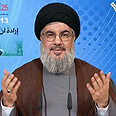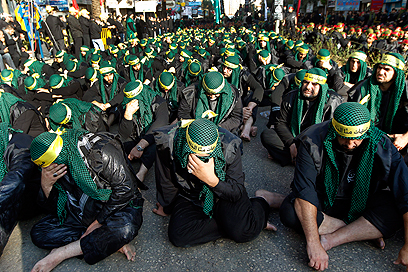
Analysis: End of Hezbollah's resistance myth
Support for Assad in Syrian civil war proves Lebanese terror group not fighting for well being of fellow Arabs or Palestinian cause
Applied to the region, the notion of resistance has been defined since the Iranian revolution of 1979 as both a social policy and an international posture.
Related stories:
- Nasrallah: Galilee will be in danger before Beirut
- Blast hits Hezbollah convoy near Syrian border
- New Iran president backs Syria's Assad, Hezbollah
On the internal level, Hezbollah has been known to position itself in favor of the Lebanese Shiite population thus acting like a revolutionary party moving against "arrogant" political forces. This rationale based upon a non-state and extra-parliamentary welfare system had been attracting the masses of poorer branches of the Lebanese society.
The fact that a number of Christian parties did adhere to this discourse and strategy, showed that the Hezbollah message could be exported outside the traditional Shiite boundaries.
The strength of the movement nevertheless lies on its ability to take full advantage of the popular support it enjoys within a part of the Lebanese society as well as in other regional circles to build, develop and sanctify the resistance myth. The core and unique raison d'être of the non-state armed militia is based on the fact of waging a continued campaign against what are deemed as Arabs' enemies and more generally the enemies of Islam.
For that reason the resistance myth has found itself anchored on three pillars: An all-out and relentless terrorist campaign against Israel in the region, a global terrorist network serving the goal of harming Israeli, Jewish and Western interests and a powerful military build-up inside Lebanon to assert and further Iranian strategic posture in the Near East.
The Palestinian card has been wisely utilized by Hezbollah’s cadres as it became, over the last two decades, a parallel to objective of liberating Lebanese territories. This situation, effectively putting Hezbollah in a protracted state of war, has been made possible by the impossibility of the party to reach its goals and by the inability of Israel to eradicate the Hezbollah threat.
In other words, even if Israel would have left the Cheba'a farms and Ghajar, the so-called Party of God would have had the legitimacy to continue the fight against the Jewish state due to its attachment to the Palestinian discourse.
The resistance myth as a whole is suffering a knockout blow. Since the 2006 summer war, a number of Lebanese parties and movements have become extremely outspoken concerning the need to limit Hezbollah's armed capabilities. It is nevertheless in the ruins of the Syrian crisis that Hezbollah has voluntarily sealed the end of its role as the Arab resistance champion, a role which it had created for itself a decade ago.
Three steps are instrumental to understand the way Hezbollah revolutionized its posture. The movement is no longer a Lebanese or an Arab strong element but it is in the process of becoming solely an armed tool to the Iranian foreign policy. The first point has been demonstrated with the 2006 war and the 2008 civil war test-run. These events proved to the Lebanese people that Hezbollah gives no value to the overall Lebanese nation but is only interested in furthering its interests.
By turning its guns against fellow Lebanese, Nasrallah has demonstrated the first fallacy of its rhetoric: Hezbollah does not fight for Lebanon.
As an internal policy matter, since the fall of the Saad Hariri government, Hezbollah has effectively become the strongest force in the country thus transforming itself indirectly into a governing party, leaving its opposition role. This situation is leading to a cannibalization of Lebanese resources by the Shiite party, an increased repression by Hezbollah's Shabiha against all critics and a transformation of Lebanese State interests into Hezbollah's on regional interests.
The last step is found in the all out support Hezbollah provides the Bashar Assad regime. With thousands of operatives in Syria, Hezbollah is a major warring party in the civil war. As its first large scale international ground intervention, Syria proves the fallacy of the second aspect of the resistance myth: Hezbollah does not fight for the well being of fellow Arabs or of the Palestinian populations.
The Syrian regime has effectively entered into conflict with Palestinians and Hamas has cut its ties with its former protector. On the other hand, Nasrallah vowed to support the Iranian-backed government no matter what. Turning its guns on fellow Arabs and virtually making Lebanon the backyard of a regional conflict, Hezbollah once again proved its own resistance myth wrong.
The question is then, what's next for Hezbollah? As the resistance myth is coming apart, the first results of a challenge to the Shiite Party monopoly in Lebanon are being felt. Hezbollah operatives are being targeted in their traditional safe havens. Car bombings and rocket fire targeting Dahiye and IEDs in the Bekaa valley are to be considered the first step of an increased campaign led against Hezbollah by Syrian rebels, Palestinians and Lebanese Sunni extremists.
The Lebanese security environment is likely to tilt when local Lebanese forces opposed to Hezbollah, may they be Christian or Sunni, will consider it beneficial to increase their political and armed pressure against Hezbollah and its supporters.
The end of the resistance myth doesn't bode well for the overall stability in Lebanon. As Hezbollah may be forced to fight a two-front protracted war, a civil conflict on Israel Northern border appears to be ever more likely. In a situation of organized chaos, the Hezbollah global terrorist network will possibly be used to attack Israeli, Jewish and Western targets in order to divert the international attention from the Lebanese situation and to further Iranian foreign policy objective, a technique which has already been used in the 1980s and early 1990s.
Riccardo Dugulin holds a Master degree from the Paris School of International Affairs (Sciences Po) and is specialized in International Security. He is currently working in Paris for a Medical and Security Assistance company. He has worked for a number of leading think tanks in Washington DC, Dubai and Beirut. His personal website is www.riccardodugulin.com
- Receive Ynetnews updates directly to your desktop











